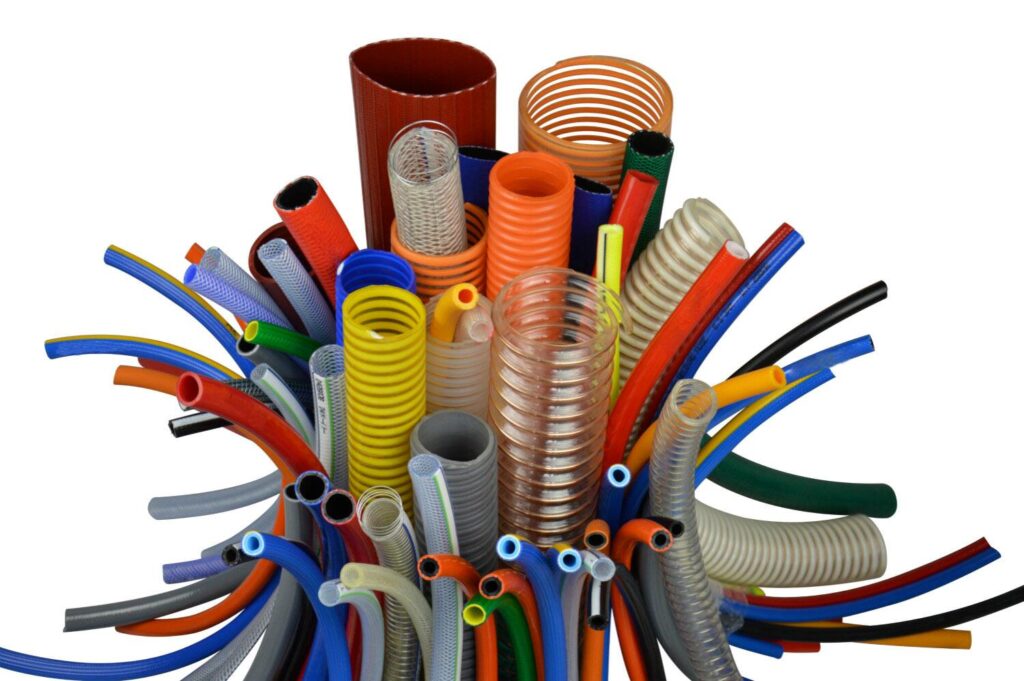
Sustainable agriculture is becoming increasingly vital as the world grapples with the challenges of climate change, resource scarcity, and food security. PVC HOSE Manufacturer have emerged as essential tools in the agricultural sector, offering effective solutions for irrigation, fluid transport, and other applications. This article explores the role of PVC hoses in sustainable agriculture, highlighting their benefits, applications, and innovations that contribute to more environmentally friendly farming practices.
1. Efficient Irrigation Systems
One of the primary uses of PVC hoses in agriculture is in irrigation systems. Efficient water management is crucial for sustainable farming, and PVC hoses play a significant role in optimizing water usage.
- Drip Irrigation: PVC hoses are commonly used in drip irrigation systems, which deliver water directly to the plant roots. This targeted approach minimizes water waste and ensures that crops receive the precise amount of moisture needed for optimal growth. By reducing evaporation and runoff, drip irrigation using PVC hoses contributes to more sustainable water use.
- Sprinkler Systems: PVC hoses are also utilized in sprinkler systems, allowing for even water distribution across fields. These systems can be designed to operate with lower pressure, further enhancing water efficiency and reducing energy consumption.
2. Durability and Longevity
The durability of PVC hoses makes them an attractive option for agricultural applications.
- Weather Resistance: PVC hoses are resistant to UV rays, chemicals, and moisture, making them suitable for various environmental conditions. This durability reduces the need for frequent replacements, minimizing waste and conserving resources.
- Longevity in Use: High-quality PVC hoses can last for years with proper maintenance, providing farmers with reliable tools for their irrigation and fluid transport needs. This longevity contributes to cost savings and sustainability by reducing the frequency of hose replacements.
3. Versatility in Applications
The versatility of PVC hoses makes them valuable in various agricultural applications beyond irrigation.
- Fertilizer and Pesticide Application: PVC hoses are commonly used to transport fertilizers and pesticides directly to crops. This precision application minimizes waste and reduces the environmental impact of chemical use, supporting sustainable farming practices.
- Fluid Transport: Farmers use PVC hoses to transport water, milk, and other liquids around their operations. Their flexibility and adaptability make them suitable for various transport tasks, streamlining agricultural processes.
4. Cost-Effectiveness
Cost considerations are crucial for farmers, especially in a landscape where margins can be tight.
- Affordable Solutions: PVC hoses are generally more cost-effective than alternatives, making them accessible for farmers of all sizes. This affordability allows farmers to invest in high-quality hoses without compromising their budgets.
- Reduced Labor Costs: With efficient irrigation and transport systems using PVC hoses, farmers can reduce labor costs associated with manual watering and chemical application. This efficiency not only saves money but also allows farmers to focus on other critical aspects of their operations.
5. Innovative Features for Sustainability
Recent innovations in PVC hose manufacturing are enhancing their role in sustainable agriculture.
- Recyclable and Eco-Friendly Materials: Manufacturers are increasingly focusing on developing recyclable PVC materials for hose production. This shift towards sustainable materials helps reduce plastic waste and promotes circular economy principles in agriculture.
- Smart Technology Integration: The incorporation of IoT technology into PVC hoses is enabling farmers to monitor irrigation and fluid transport in real time. Smart hoses can provide data on water usage, soil moisture levels, and more, allowing for better resource management and more sustainable farming practices.
6. Education and Training
To maximize the benefits of PVC hoses in sustainable agriculture, education and training for farmers are essential.
- Best Practices for Use: Providing farmers with knowledge about the best practices for using PVC hoses in irrigation and fluid transport can enhance efficiency and sustainability. Workshops and training programs can help farmers understand how to optimize hose performance for their specific needs.
- Maintenance and Care: Educating farmers on proper maintenance techniques can extend the lifespan of PVC hoses, further contributing to sustainability. This includes regular inspections, cleaning, and storage practices that prevent damage and wear.
7. Challenges and Considerations
While PVC hoses offer numerous benefits for sustainable agriculture, there are challenges and considerations to keep in mind.
- Environmental Concerns: As with any plastic product, there are environmental concerns related to the production and disposal of PVC hoses. Farmers and manufacturers must prioritize recycling and responsible disposal to mitigate these impacts.
- Quality Variability: The quality of PVC hoses can vary significantly between manufacturers. Farmers should prioritize sourcing hoses from reputable suppliers to ensure they receive durable and reliable products.
Conclusion: A Sustainable Future with PVC Hoses
PVC hoses are playing a vital role in advancing sustainable agriculture by enabling efficient water management, reducing chemical waste, and providing durable, cost-effective solutions for farmers. As the agricultural sector continues to adapt to the challenges of climate change and resource scarcity, the innovations in PVC HOSE Manufacturer will further enhance their contributions to sustainability.
By embracing the benefits of PVC hoses and investing in education and training, farmers can optimize their operations while promoting environmentally friendly practices. The future of sustainable agriculture is bright, with PVC hoses serving as essential tools in the pursuit of more efficient, resilient, and eco-conscious farming systems.